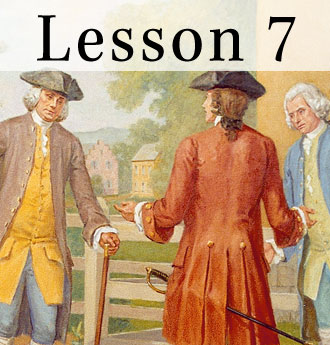The Resource Center » Level 3 » Unit 1 »
Lesson 7: What Basic Ideas about Government and Rights Did the State Constitutions Include?

Lesson Purpose
After declaring independence the Founders designed new state governments to protect individual rights and to promote the common good. This lesson shows how the constitution of Massachusetts in particular was designed to achieve these ends. State constitutions also contained bills or declarations of rights. These guarantees of rights, for which Virginia's Declaration of Rights served as a model, had a great influence on the development of the U.S. Bill of Rights.
Lesson Objectives
When you have finished this lesson, you should be able to
- explain the basic ideas about government and rights that are included in state constitutions,
- explain how the experiences of the states in developing their constitutions and bills of rights influenced the framing of the U.S. Constitution and Bill of Rights, and
- evaluate, take, and defend positions on the theory of legislative supremacy, the importance of the Virginia Declaration of Rights, and the role of declarations of rights in early state constitutions.
Lesson Terms
checks and balances
In American constitutional thought, distributing and balancing the powers of government among different branches so that no one branch or individual can completely dominate the others. See also balance of power
legislative supremacy
veto
Lesson Biographies
Locke, John (1632-1704 CE)
John Locke, a physician and philosopher, worked with famous scientists, including Robert Boyle and Robert Hooke. In contrast to Hobbes, Locke used state of nature and social contract theory to justify limited government and the preservation of individual rights, particularly life, liberty, and property. Locke is sometimes called "America's philosopher" because his Second Treatise of Government (1690) was widely read by the colonists and important ideas found in it (as well as in works of English republican writers) are found in the Declaration of Independence, especially his theories of natural rights and his defense of violent revolution after "a long train of abuses" of power by rulers. Two verbatim phrases of Locke's are found in the Declaration.
Mason, George (1725-1792 CE)
Madison, James (1751-1836 CE)
Lesson Primary Sources
Virginia Declaration of Rights
Virginia Declaration of Rights
State Constitution
Two Treatises of Government--John Locke, 1689
Montesquieu--The Spirit of Laws, 1748
The Constitution of Massachusetts 1780
Constitution of Pennsylvania 1776
James Madison - Memorial and Remonstrance Against Religious Assessments
Virginia Act for Establishing Religious Freedom
Declaration of Independence 1776






